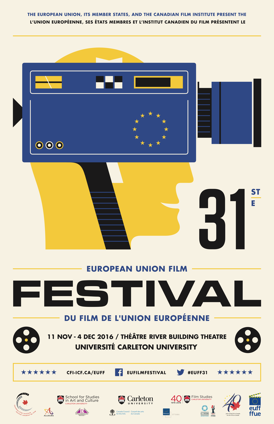Canada and the European Union have never been closer than right now with the historic atmosphere of the CETA signing ceremony still in the air. The 31st annual European Union Film Festival is offering a chance to get even closer.
Film lovers in Ottawa can catch a glimpse into the imagination of 25 EU member states over the course of four weekends beginning Friday, November 11th. A broad selection of award-winning and never before seen films (in Ottawa) from the festival circuit will be screened in the state of the art River Building Theatre at Carleton University which is the new home of this year’s prestigious festival.
In collaboration with the European Union Member States, the Delegation of the European Union to Canada and the Canadian Film Institute, 25 award-winning films ranging from drama to comedy to tragedy have been selected to showcase a range of contemporary stories.
Her Excellency Marie-Anne Coninsx, Ambassador of the European Union to Canada, describe the spectrum of films being presented as such: “The festival brings European culture, in all its diversity, history and richness to Canada.”
Her Excellency also notes that many Ambassadors will be at the screenings and make introductory remarks, “since the festival is a way for the Ambassadors from EU member states in Ottawa to be part of a big family and present themselves as well as their countries here in Ottawa.”
Additionally, she mentions the festival format as important as well since many films are being screened on the weekend and you are bound to learn about European history, recent and otherwise, through them.
Canadian Film Institute Director Tom McSorley has described the growth of the oldest film festival in Ottawa as staggering. The film festival has grown while the European Union itself has grown which gives pause to the pivotal moment we are in right now – where the European Union is about to be reduced to 27 from 28 member states. It makes for an interesting point in time to have these windows into the cultures from the European Union opened for us here in Canada through these films.
Some films confront issues from a national point of view; both World War I and World War II are examples of these cinematic attempts to work through the past. Other stories focus on more recent and contemporary issues.
The Cypriot film, for example, both reflects family themes and a family’s recent financial stress, seemingly caused by their country joining the EU. There are also sci-fi films, comedies, documentaries, and dramas. There is even a film about making a documentary. Image is Belgium’s entry and it is about a journalist who wants to make a documentary in a rough neighbourhood in Brussels that examines the recent influx of refugees. There is something for everyone, according to Canadian Film Institute Director Tom McSorley.
The 31st European Union Film Festival runs on weekends from Nov. 11th to Dec. 4th at Carleton University.
For more on the 31st European Union Film Festival, please listen to my conversation with Canadian Film Institute Director Tom McSorley, we discuss the 31st European Union Film Festival and his top 3 film picks.

